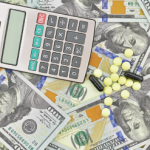Several years ago, we took a family vacation with my mother in Greece. My mother, like many patients, managed to forget to bring all of her medications and did not mention this oversight until we had been traveling for several days. Fortunately, we found a pharmacy in Sparta that was able, with the help of pictures, to figure out what medications my mother needed. We were all surprised at how inexpensive the medications, including a number of brand-name drugs, were and my mother took full advantage of this situation to obtain several months’ worth of her medications. Indeed, my mother was so enthusiastic over her bargains that she began thumbing through the pictures in the pharmacist’s catalog asking whether various cheap drugs could help her. We finally put a stop to her shopping frenzy when she asked whether the cyclophosphamide pills that cost practically nothing would be good for her hypertension.
The high cost of drugs in this country should be corrected not by reform of the healthcare system but by appropriate trade agreements.
Inequitable Economics of Drugs
If nothing else, this incident illustrates an ongoing irritant for many Americans. Why do we pay so much more for our medications than people pay abroad? Given the difference in prices, the purchase of drugs from Canada is even encouraged by some states to reduce their costs. The obvious and conventional explanation for this price differential is that countries with a central purchasing mechanism—and therefore built-in economies of scale—have much more clout in negotiating prices with the pharmaceutical industry than the United States, where no single entity negotiates the price of drugs. The single-party payers of the industrialized world have another negotiating advantage: as arms of the government, they can also threaten to take away the patent protection for any new drugs. Not selling the drugs at a price that health agencies are willing to pay would deprive their citizens of potentially life-saving interventions and trigger an “emergency” elimination of patent protection so that cheaper generic versions of the drug could be quickly brought to market.
Developing new drugs is an expensive undertaking and not for the faint of heart. Only a small minority of agents successfully makes its way from the laboratory to the clinic. Patent protection with the exclusive right to sell a specific agent over a defined period of time permits the pharmaceutical industry to recoup its development costs and invest in the next potential drug. Thus, limiting the selling price of a new drug in an entire country pushes the pharmaceutical industry to make up for this sales cap where it can. This place is the largely unregulated market of the United States. The clear implication of this analysis is that drug development (and pharmaceutical profit) is largely funded by the patients (taxpayers) of the United States, a clear subsidy for other countries.


